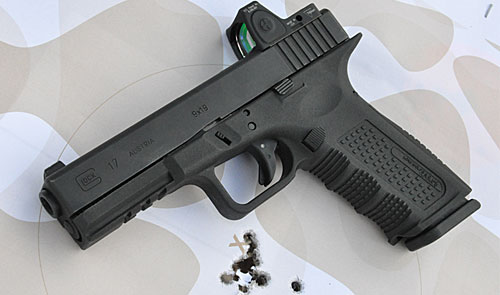
Sight alignment, sight picture and front sight, front sight, front sight. It’s a sermon firearms instructors endlessly preach to pistol shooters at ranges across the land. Thus it has always been and always will be… or maybe not.
The most difficult lesson pistol shooters have to learn is the need to align the front and rear sights and shift the focus of the eyes from the target to the front sight. Unfortunately this lesson may take some time to learn and may require shooting a large quantity of ammunition before it sinks in. Fortunately, modern electronic sights are changing this and I hope I’m around long enough to see them in common use. Why is using a red dot sight different than using traditional iron sights? When we look through these sights there is no need to align two objects, as in front and rear sights, and no need to change our focus from the target to the front sight. Shooting a handgun with a red dot sight is “backwards” from traditional sighted shooting because there is no sight alignment and we can remain focused on the target. In theory, this is faster and more accurate. It’s no wonder these sights are popular with competitive shooters, the police and the military.
Electronic sights are making inroads with defensive and concealed carry pistol shooters too. Three important developments have driven this. The first is compact size, the second is long battery life and durability and the third is ease of use and the availability of easy mounting solutions. Size and weight are always factors in the concealed carry equation. Extended battery life of the newer optics means they can be left on for years, and this means the sight is always ready – there’s no need to find the switch or activate the sight. Mounting the sight is easier than ever. For example, Smith & Wesson produces optics-ready defensive pistols and outfits like Brownells sell sight mounts as well as replacement slides with machined sight cuts for these electronic sights.
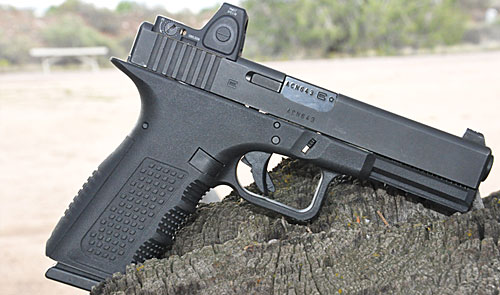
About a year ago I decided to put together a defensive pistol with an optical sight and devote some time to shooting it. I started with a Glock style frame made by Lone Wolf Distributors. The Timberwolf frame has several worthwhile features, including a Picatinny rail on the dust cover, a slim grip profile with replaceable flat and arched inserts, a beavertail grip extension and, most appealing to me, a grip angle that makes the pistol point like a 1911. This makes transitioning from a 1911 to the Timberwolf easier, as the grip angle of a Glock tends to leave me pointing high. I took a Glock 17, 9mm slide to Mark Housel at L&M Precision Gunworks right here in Prescott and in short order he had machined the slide and mounted my choice of optic for this project, a Trijicon RMR. Though it permanently alters the slide, I prefer having it machined to place the sight as low as possible. You can install these sights higher on the slide with mounts that fit in the standard sight dovetails but it’s not as secure or compact and the higher the sight sits above the barrel the greater the offset, that being the difference between the line of sight and point of impact of the bullet. Although Mark offers high “suppressor sights” on slides with these modifications I chose not to go that route and simply installed an XS Big Dot sight on the front of the Glock slide to give me a quick, close range pointing reference.
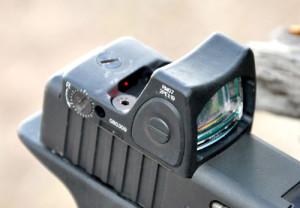 Trijicon’s RMR (Rugged Miniature Reflex) is an excellent choice for mounting on a defensive pistol. The sight I used is their adjustable brightness model with 6.5 minute of angle red dot. The brightness of the dot is controlled by a couple of rubberized push pads. Windage and elevation adjustments can be turned with a small coin or cartridge rim. Once mounted low in the slide the sight is rugged, unobtrusive and doesn’t interfere with most open top holsters designed for the Glock 17. The RMR will run for 25 days straight on one battery with the brightness turned up as bright as it will go. With the brightness set at a much more useful level the sight will illuminate for a year or two before needing a battery change. This means, for all practical purposes, you can turn the sight on and leave it on for a day at the range, a night on the street or during normal carry situations. If you’re concerned with battery life you can turn the sight off when you take off your pistol or change the battery once a year when you change your smoke alarm batteries.
Trijicon’s RMR (Rugged Miniature Reflex) is an excellent choice for mounting on a defensive pistol. The sight I used is their adjustable brightness model with 6.5 minute of angle red dot. The brightness of the dot is controlled by a couple of rubberized push pads. Windage and elevation adjustments can be turned with a small coin or cartridge rim. Once mounted low in the slide the sight is rugged, unobtrusive and doesn’t interfere with most open top holsters designed for the Glock 17. The RMR will run for 25 days straight on one battery with the brightness turned up as bright as it will go. With the brightness set at a much more useful level the sight will illuminate for a year or two before needing a battery change. This means, for all practical purposes, you can turn the sight on and leave it on for a day at the range, a night on the street or during normal carry situations. If you’re concerned with battery life you can turn the sight off when you take off your pistol or change the battery once a year when you change your smoke alarm batteries.
Shooting one of these sights takes a little getting used to. The RMR looks like a tiny television and our eyes have a tendency to want to center the dot in the screen. This is completely unnecessary – simply press the trigger when the dot covers the target, regardless of whether the dot is centered. For fast, close range shooting from the holster I like to keep both eyes open, focus on the target and, as the pistol comes into alignment, break the shot when the red dot appears in my line of sight. For precision shooting, or shooting at longer ranges, I tend to shift my focus slightly to the dot, even though I’m pretty sure it isn’t necessary (old habits are hard to break) and the target and the dot seem to appear in the same plane when viewed though the RMR. For those with aging eyes or vision needing corrective lenses, these red dot sights are the way to go and I’m pleased they’re becoming more practical. From the standpoint of a firearms instructor, I can tell you these sights can be easier to learn and use than traditional sights. The downside is price – the RMR retails for around $600 – but I expect the price of these sights to come down as they continue to develop and become more commonly used.
I want to recommend the Sig Sauer Academy and instructor Scott Ballard if you’re interested in learning more about shooting red dot sights on defensive handguns. Scott has been running thousands of rounds through defensive pistols equipped with these sights and is developing a class for the Academy focused on these sight/pistol combinations. If you’re interested in this class give Kathleen a call at (603) 610-3400.
For more information:
www.trijicon.com
www.lonewolfdist.com
www.landmprecisiongunworks.com
www.sigsaueracademy.com
www.brownells.com
www.xssights.com
About the Author:
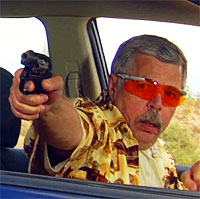 Ed Head is a regular on Shooting Gallery, Gun Stories and Down Range TV. He has worked for almost 30 years in law enforcement, first in the United States Air Force and then with the United States Border Patrol, retiring as a Field Operations Supervisor. During his Border Patrol career, Ed worked in a variety of patrol, investigative and training capacities. Ed has an extensive background as a firearms instructor, having trained thousands, ranging from beginners to police, military and special operations personnel. Having taught at Gunsite for 20 years, Ed first trained there under the world famous shooting school’s founder, Jeff Cooper, then later ran the school as the operations manager for more than five years. Ed lives in Chino Valley, Arizona, where he continues to teach and write.
Ed Head is a regular on Shooting Gallery, Gun Stories and Down Range TV. He has worked for almost 30 years in law enforcement, first in the United States Air Force and then with the United States Border Patrol, retiring as a Field Operations Supervisor. During his Border Patrol career, Ed worked in a variety of patrol, investigative and training capacities. Ed has an extensive background as a firearms instructor, having trained thousands, ranging from beginners to police, military and special operations personnel. Having taught at Gunsite for 20 years, Ed first trained there under the world famous shooting school’s founder, Jeff Cooper, then later ran the school as the operations manager for more than five years. Ed lives in Chino Valley, Arizona, where he continues to teach and write.

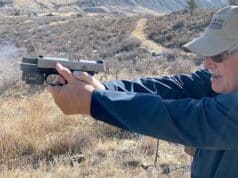
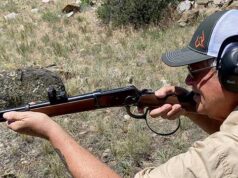
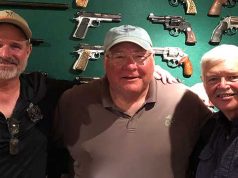
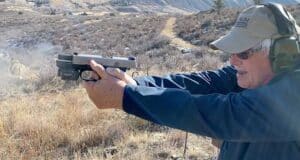
What a great compliment to Gabe Suarez and the folks over at Suarez International Training. They have had RMR training for five plus years.